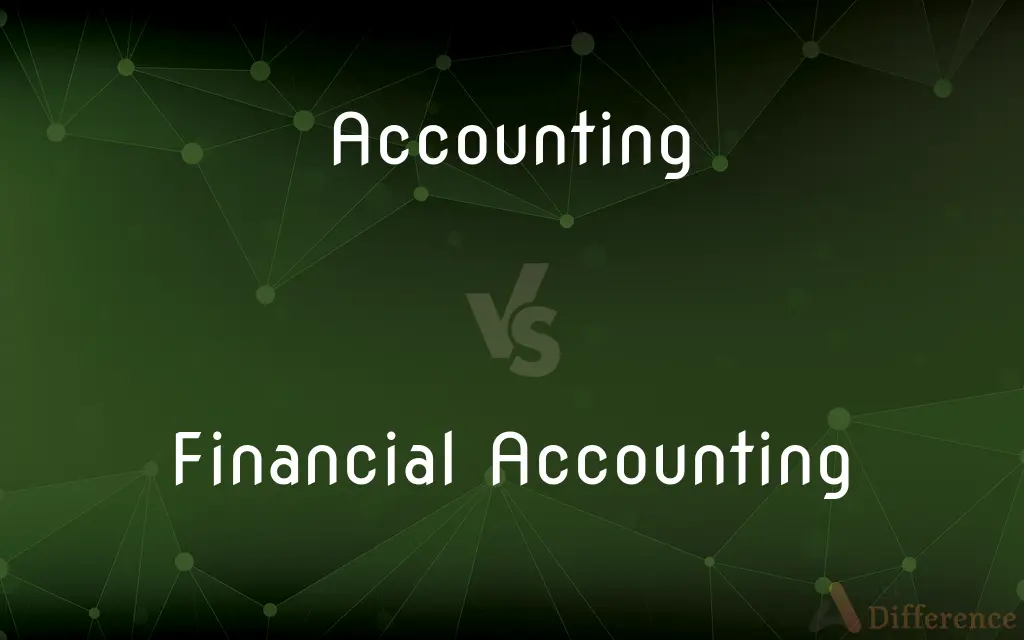Accounting vs. Financial Accounting — What's the Difference?
By Maham Liaqat & Urooj Arif — Published on July 18, 2024
Accounting is a discipline encompassing the recording, classifying, summarizing, and interpreting of all financial transactions, while financial accounting focuses specifically on the preparation of financial statements for external users like investors.

Difference Between Accounting and Financial Accounting
Table of Contents
ADVERTISEMENT
Key Differences
Accounting serves as the backbone of financial management in any business, providing a comprehensive overview of the company's financial health and performance. It includes various branches such as financial accounting, managerial accounting, tax accounting, and auditing. Financial accounting, a subset of accounting, specifically deals with the summary, analysis, and reporting of financial transactions related to a business to entities outside the organization.
The primary objective of financial accounting is to prepare financial statements—including the balance sheet, income statement, and cash flow statement—that accurately reflect the company's financial status in a specific period. These documents are crucial for external stakeholders, such as investors, creditors, and regulatory agencies, to make informed decisions regarding their engagement with the company.
In contrast, accounting encompasses a broader scope, including the internal management of a company's financial information. Managerial accounting, for example, focuses on providing internal stakeholders, such as managers and employees, with the financial information necessary to make informed business decisions. This can involve budgeting, forecasting, and cost analysis, which are not typically within the realm of financial accounting.
Another key difference is the regulatory framework. Financial accounting is governed by standardized principles and regulations, such as Generally Accepted Accounting Principles (GAAP) in the United States or International Financial Reporting Standards (IFRS) globally. These standards ensure the consistency, comparability, and reliability of financial statements. Meanwhile, the broader field of accounting, especially aspects like managerial accounting, may not strictly adhere to these principles since its reports are intended for internal use.
Financial accounting also emphasizes historical data, presenting a retrospective view of a company's financial activities over a specific period. Conversely, other areas of accounting, particularly managerial accounting, are more forward-looking, focusing on planning and forecasting to guide future business strategies.
ADVERTISEMENT
Comparison Chart
Scope
Broad, covering all financial transactions
Focuses on summarizing financial transactions for external reporting
Main Objective
To provide a comprehensive financial overview of a company
To prepare financial statements for external stakeholders
Key Functions
Recording, classifying, summarizing, analyzing, and interpreting financial information
Preparing balance sheets, income statements, and cash flow statements
Users
Internal (managers, employees) and external users (investors, creditors)
Primarily external users (investors, creditors, regulatory agencies)
Standards and Regulations
Varies by branch (GAAP, IFRS for financial accounting; internal guidelines for managerial accounting)
Strictly adheres to GAAP, IFRS, or other national standards
Focus
Both historical and future-oriented financial information
Mainly historical financial performance and position
Reports
Internal reports (budgets, forecasts) and external financial statements
External financial statements only
Compare with Definitions
Accounting
The systematic process of recording financial transactions of a business.
Accounting ensures that every financial transaction is accurately recorded.
Financial Accounting
Adheres to strict regulatory standards like GAAP or IFRS.
Her financial accounting work complies with international standards.
Accounting
Involves summarizing and analyzing financial information for decision-making.
Through accounting, the company assesses its financial health.
Financial Accounting
Aims to present an accurate picture of a company's financial performance.
Financial accounting reveals the company's profitability over the fiscal year.
Accounting
Provides information for both internal management and external reporting.
Accounting reports help managers plan and control operations.
Financial Accounting
Focuses on creating financial statements for external use.
Financial accounting produced the annual report for stakeholders.
Accounting
Encompasses various branches including managerial, tax, and financial accounting.
He specializes in tax accounting within the broader field.
Financial Accounting
Used by investors and creditors to make informed decisions.
Investors rely on financial accounting to assess the risk of their investment.
Accounting
Follows specific principles and standards, varying by the area of focus.
Accounting practices adhere to GAAP for reliability and consistency.
Financial Accounting
Historical in nature, providing a retrospective financial analysis.
The financial statements reflect last quarter's business activities.
Accounting
(business) The development and use of a system for recording and analyzing the financial transactions and financial status of an individual or a business.
Accounting
A system that provides quantitative information about finances
Accounting
The occupation of maintaining and auditing records and preparing financial reports for a business
Accounting
A statement of recent transactions and the resulting balance;
They send me an accounting every month
Common Curiosities
What is the main purpose of accounting?
To record, classify, summarize, analyze, and interpret all financial transactions of a business, providing a clear picture of its financial health and assisting in decision-making.
How does financial accounting differ from managerial accounting?
Financial accounting focuses on preparing financial statements for external stakeholders based on historical data, while managerial accounting provides forward-looking, internal reports for business decision-making.
Can accounting help in tax preparation?
Absolutely, as it ensures accurate financial records are maintained, which are essential for calculating and filing taxes.
Who uses financial accounting reports?
External stakeholders, such as investors, creditors, and regulatory agencies, to make decisions regarding their relationship with the company.
Are financial accounting reports mandatory?
Yes, for publicly traded companies, to ensure transparency, consistency, and comparability, adhering to specific regulatory standards like GAAP or IFRS.
Can accounting principles vary between companies?
While the fundamental principles are consistent, especially for financial accounting (due to GAAP/IFRS), companies may have different internal guidelines for managerial accounting.
Is financial accounting relevant for non-profit organizations?
Yes, as it helps communicate their financial position and stewardship of resources to donors, grantors, and regulatory bodies.
What role does technology play in accounting?
Technology streamlines accounting processes, from transaction recording to report generation, improving accuracy and efficiency.
How often are financial accounting reports generated?
Typically, on a quarterly and annual basis, to provide timely information to external stakeholders.
Why is financial accounting considered historical?
Because it primarily documents and reports on transactions that have already occurred, providing a historical financial perspective of the company.
Share Your Discovery

Previous Comparison
Espresso vs. Cold Brew
Next Comparison
Soccer Boots vs. Football BootsAuthor Spotlight
Written by
Maham LiaqatCo-written by
Urooj ArifUrooj is a skilled content writer at Ask Difference, known for her exceptional ability to simplify complex topics into engaging and informative content. With a passion for research and a flair for clear, concise writing, she consistently delivers articles that resonate with our diverse audience.













































